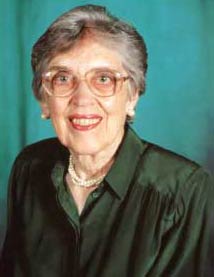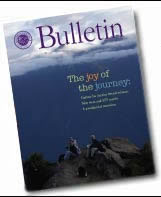Changing the world
one conflict at a time
By Melanie Histand '06

After a lifetime of mentoring school children as a teacher and a
guidance counselor, Pearl Hartz ’59 found a new calling and
a new crowd to counsel – some of whom are more familiar with
correctional institutions and courtrooms.
In 1993, following 30 years of work in schools, Hartz began her second career,
establishing and directing a victim/offender reconciliation program (VORP)
in San Diego, Calif.
“Often, in evaluating what I would do in retirement, I reflected on Jesus’ concern
for the poor, the prisoners, the blind and the oppressed,” said Hartz. “I
knew I wanted to do something to help some of those disempowered persons in our
world.”
Concern for what Hartz saw as an ineffective justice system contributed to
her vision for a community mediation program. “The United States has
the highest per capita incarceration rate in the world,” she said. “Something
needs to be done.”
Victim/offender reconciliation programs bring wrongdoers face-to-face with
those who have suffered because of their crimes, with the assistance of a trained
mediator, usually a community volunteer. Crime is personalized as offenders
learn the human consequences of their actions, and victims have the opportunity
to speak their minds and their feelings to the one who most ought to hear them,
contributing to the healing process. And for the offender, “this process
puts a human face on the crime,” said Hartz.
The volunteers, mediators and employees of VORP “see crime as a violation
of people and a breakdown of relationships,” said Hartz. “We believe
the criminal justice system, although they can address the legal side of it,
are not able to bring healing and reconciliation because they’re not
designed for it. The community needs to play that part.”
Hartz continued, “In today’s world, there is a really short supply
of empathy. People need to be led in mediation experiences that enable them
to be sympathetic. They have to learn how to communicate.”
Hartz and members of her small group from Mennonite Fellowship of San Diego
laid the groundwork for the victim/offender reconciliation program, modeled
after an already existing Fresno organization. Ron Claassen, director of the
Fresno Pacific University Center for Peacemaking and Conflict Studies, provided
guidance and support.
The program, which may receive as many as 145 referrals in one year, sets up
individual and joint meetings with the victim, the offender and a mediator,
facilitates a written contract between the parties and monitors the relationship
to ensure the contract is fulfilled.
Unfortunately, not all cases are suited for mediation. If the offender denies
any guilt, there isn’t much VORP can do. But more often than not, both
parties are willing to come together to “make it right,” said Hartz.
Day by day, Hartz sees lives torn by anger, conflict and pain knitted back
together once again through mediation. A bitter conflict between two girls,
ages 17 and 18, initially did not give Hartz much hope for a resolution; she
had hardly expected them to be able to come together for a mediation meeting.
But they did, and the result was incredible.
“After the meeting, I saw them going down the hall arm in arm,” said
Hartz.
A couple weeks later, she received a phone call from the victim, expressing
gratitude and relief. “Those were the kinds of things that fed me,” she
said.
Hartz recalled that another encouraging experience began, as always, with a
phone call. This time it wasn’t a referral officer on the other end of
the line, but a descendant of the Assiniboine Indian tribe. The woman calling
was seeking help from a restorative justice agency for a family situation. “She
wanted an out-of-court resolution. She wanted to use the kind of practice that
her forbearers had used,” said Hartz.
"That was a high point because I saw these two streams of restorative
justice coming together – the one that we’ve arisen from, which is
Mennonite-initiated, and this other from a primitive tribe,” she continued.
Hartz’s life of service jump-started with four years as a Mennonite Central
Committee and Mennonite Board of Missions volunteer soon after her graduation
from Goshen College. She lived in Gulfport, Miss., teaching vacation Bible
school and assisting at churches, and also spent time in the community of St.
Anne, Ill., helping to start a kindergarten.
“Service, for me, had always been part of being a Mennonite,” said
Hartz. “But the time had come to expand my horizons a little farther. Now,
with greater understanding of life beyond my home community, more doors for service
in the world have opened.”
After 10 years of serving as director of VORP in San Diego, later renamed the
Restorative Justice Mediation Project (RJMP), Hartz is now retired. She continues
to act as a consultant and enjoys “doing things that I couldn’t
do as an administrator because I didn’t have time,” such as working
towards more involvement from faith communities. With its small beginning in
the Mennonite Fellowship of San Diego, the organization has since expanded
to include participation from numerous other denominations, including Church
of the Brethren, United Methodist, Episcopalian and United Church of Christ.
While Hartz rejoices in each situation where mediation proves successful, she
realizes the stream of victims and offenders walking through the RJMP doors
will be never-ending.
“Conflict resolution and reconciliation are so thoroughly needed always,” she
said. “They are skills that are basic to life in families, life in churches,
the workplace, and are not automatic. I believe that some people learn them in
their families, but many people don’t have that nurturing.
Leading this program has probably been the hardest things I’ve ever done,
but it’s also brought me great satisfaction,” said Hartz, recalling
that a police officer once told her, “What you do could change our world!”
In the 50 years since Hartz’s college graduation, she moved across the
country, changed careers and has yet to show signs of slowing down. She still,
however, remembers fondly her humble roots at Goshen College, “a place
where my values were honed through opportunities I had to learn from people.
“ You just always feel like you’re part of a special
community,” she said.
< 1 |
2 |
3 >



 After a lifetime of mentoring school children as a teacher and a
guidance counselor, Pearl Hartz ’59 found a new calling and
a new crowd to counsel – some of whom are more familiar with
correctional institutions and courtrooms.
After a lifetime of mentoring school children as a teacher and a
guidance counselor, Pearl Hartz ’59 found a new calling and
a new crowd to counsel – some of whom are more familiar with
correctional institutions and courtrooms.